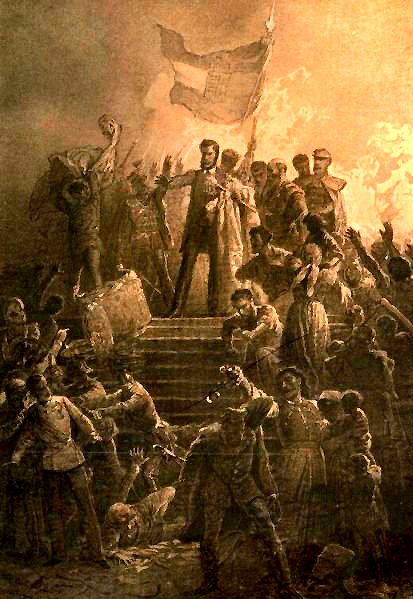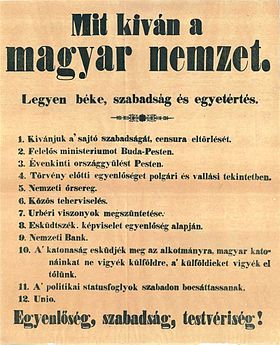[VoeH] 15th of March - National day of Hungary
 •
by
•
by Voice of eHungary









Today is 15th of March. It's an important day in the Hungarian history the day of Hungarian Revolution of 1848. I would like to write about this to you
🙂

The Google today
The Hungarian Revolution of 1848 was one of the many European Revolutions of 1848 and closely linked to other revolutions of 1848 in the Habsburg areas.
The revolution in the Kingdom of Hungary grew into a war for independence from the royal rule of Habsburg kings.
It's leaders were Lajos Kossuth, István Széchenyi, Sándor Petőfi and Józef Bem. The anniversary of the Revolution's outbreak, 15 March, is one of Hungary's three national holidays.

Artist Mihály Zichy's painting of Sándor Petőfi reciting the National Poem to a crowd on March 15, 1848
The revolution started in the Pilvax coffee palace at Pest, which was a favourite meeting point of the young extra-parliamentary radical liberal intellectuals in the 1840s. The news about the revolutions of the great European cities had an immediate effect on the infatuation of young radical intellectuals.
Poet Sándor Petőfi was the leader figure of the revolutionaries, his friends were the philosopher and historian Pál Vasvári and the novel-writer Mór Jókai, columnist and lawyer Gyula Bulyovszky met at Pilvax Cafe, where Petőfi recited his famous Nemzeti dal (National Song), which was written by him as a revolutionary poem on the previous day. They have decided the visitation of the faculties of the universities of Pest, where the university students, their main solid social basis and friends located.
First they attended the faculty of law at Egyetem street, where an improvised podium was raised for Petőfi, who read the 12 demands and recited the National Song. Their second stop was at the medical university in Újvilág street, where the enthusiasm was the same, the medical students joined to the revolution. Their third stop was at the university of technology with the same success, their fourth stop was at university of liberal arts who are also joined to the revolutionary masses.
Declaring an end to all forms of censorship, the revolutionaries occupied the Landerer and Heckenast printing-house (one of the largest printing-house of the city) and printed Petőfi's poem together with the twelve demands.
The largest mass demonstration was held in front of the newly built National Museum, after which the group left for the Buda Chancellery (the Office of the Governor-General) on the other bank of the Danube.
The bloodless mass demonstrations in Pest and Buda forced the Imperial governor to accept all twelve of their demands.
The 12 points:

"What the Hungarian nation wants.
Let there be peace, liberty, and concord."
1. We demand the freedom of the press, the abolition of censorship.
2. Independent Hungarian government in Buda-Pest.
3. Annual national assembly in Pest.
4. Civil and religious equality before the law.
5. National army.
6. Equal distribution of [tax] burdens.
7. Abolition of socage [land tenure].
8. Juries and courts based on an equal legal representation.
9. A national bank.
10. The army must take an oath on the Constitution, send our soldiers home and take foreign soldiers away.
11. Setting free the political prisoners.
12. Union [with Transylvania]
Austria had its own problems with the revolution in Vienna that year, and it initially acknowledged Hungary's government. Therefore the Governor-General's officers, acting in the name of the King appointed Hungary's new parliament with Lajos Batthyány as it's first Prime Minister.
On 23 March 1848, as head of state, Batthyány commended his government to the Diet.
The first responsible Hungarian government was forme
😛
Prime Minister: Lajos Batthyány
Minister of the Interior: Bertalan Szemere,
Finance minister: Lajos Kossuth,
Minister of Justice: Ferenc Deák,
Minister of defense: Lázár Mészáros,
Minister of Agriculture, Industry and Trade: Gábor Klauzál,
Minister of Labour, Infrastructure and Transport: István Széchenyi,
Minister of Education, Science and Culture: József Eötvös,
Minister besides the King (roughly Foreign Minister): Pál Antal Esterházy

Members of the Batthyány government
After the end of Summer of 1848 the Habsburgs attacked Hungary, and the Revolution war has begun...
Thanks for reading.
FaraoHun
vMoFA


Comments
majdnemelső
Sándor Petőfi: National Song
On your feet now, Hungary calls you!
Now is the moment, nothing stalls you,
Shall we be slaves or men set free
That is the question, answer me!
By all the gods of Hungary
We hereby swear,
That we the yoke of slavery
No more shall wear.
Slaves we have been to this hour,
Our forefathers who fell from power
Fell free and lived as free men will,
On land that was their own to till,
By all the gods of Hungary
We hereby swear,
That we the yoke of slavery
No more shall wear.
Whoever now his life begrudges
Deserves his death with thieves and drudges,
For setting his own worthless hide
Above his country's need and pride.
By all the gods of Hungary
We hereby swear,
That we the yoke of slavery
No more shall wear.
The sword shines brighter than the fetters
It is the finery of our betters,
Of slaves and fetters we grow bored.
Leap to my side, ancestral sword.
By all the gods of Hungary
We hereby swear,
That we the yoke of slavery
No more shall wear.
Magyars, once more our name and story
Shall match our ancestors' in glory
The centuries of shame and hurt
Can now be washed away like dirt.
By all the gods of Hungary
We hereby swear,
That we the yoke of slavery
No more shall wear.
And wheresoever we may perish
Grandchildren those graves shall cherish
Singing our praises in their prayers
To thank us that our names are theirs.
By all the gods of Hungary
We hereby swear,
That we the yoke of slavery
No more shall wear.
PODKREPA
Fényesebb a láncnál a KARD,
Jobban ékesíti a kart,
És mi mégis láncot hordtunk!
Ide veled, régi KARDunk!
A magyarok istenére
Esküszünk,
Esküszünk, hogy rabok tovább
Nem leszünk!
Magyar Nemzeti Hip-Hop Rapet!
[removed]
Lenn, lenn, a Volga mentén
Élt egy kislány Katyusa a neve
Kinn a fronton harcol a szerelme
Érte könnyes mind a két szeme
erre minek van itt szükség? miért provokálsz?
[removed]
Pöcs !
Provokálja az izraeli AS-t!
Állami műsort, közös ütést, közös március 15.i avatart, oláh rw-t senki nem provokált?
Tudod, amit a szar magyarellenes nemzetáruló yeticsicskák szoktak.
[removed]
Happy National Day!
Happy National Day, Hungary!
\o/
Rabok legyünk vagy szabadok? https://youtu.be/2ZEdFpDoaAM
.
.
.
..szolga földben nem nyughatnak.
V
12. Union [with Transylvania] ?? WTF lie like a muheres 😁
Transilvania pamant Unguresc!
Yap sa moara mortu...
Actually it is not a lie. Furthermore, a lot of romanian supported us in the 1848-'49 fights against the Habsburgs and russians, it is possible that your ancestors fought with us in that time.
And even if yours didn't, we have hundreds of years of common history.
You must be joking. One of mistakes of 1848 Hungarian revolution in Transilvania was that they did not manage to befriend Romanians who ended up fighting against Hungarians and supporting Habsburgs.
Alexandru Papiu-Ilarian, la 25 martie 1848:
„Ca român, semnez petiția cu condiția ca, în cazul când s-ar realiza drepturile poporului și egalitatea sa, să se asigure tuturor națiunilor de limbă felurită din Transilvania și Ungaria existența națională și limba maternă, iar eliberarea din iobăgie să se îndeplinească fără nici o despăgubire bănească, deoarece țăranii au plătit destul, chiar prea mult, timp de mai multe secole, de când nobilii le uzurpă nu numai drepturile civile, ci și pe cele sacre umane.”
canceliștii maghiari,
„Uniune sau moarte! Să ne unim cu Țara Ungurească, pentru că altminteri pierim!
Stupid mistake in my opinion, but gave power to the Romanian nationalist movement in Transilvania. That is how the Avram Iancu phenomenom was created.
Happy 15th March! Enjoy your national day.
8-3=1 it was partially a mistake. It was a Habrsburg intervention. "divide et impera".
Boldog Nemzeti ünnep, Magyarország!
Thanks🙂
(L) Macedonia!
Happy National Day!
Orban said it goo😛 There was no facebook in that time so the revolution started from the coffee bar through the streets xD
Boldog Nemzeti ünnep, Magyarország!
Happy National Day 🙂
voted! also remember the red revolution lead by Bela Kun and the revolution of the 56 against stalinist burocratic rule.
Bela Kun was one of the biggest traitors of our history!
We have a holyday on 23th October in memory of '56.
Why for u he was a traitor? i think he was a poor leader...same opinion had Lenin
He killed hundreds of people, because they didn't fit his ideal. When he finally failed, he left the country (and supposedly stole a lot of treasure from us). And I don't see Lenin as a role model either, but I have to say, he tried at least.
The only good he caused is, that Hungarians didn't want communismus after.
Nem tudom, kitől idéztél, de most elég nagy butaságokat írtál, Sybillak.
well i think hungarians dont like people like Karolyi also. The Revolution on the 56 was to have a socialist democracy against the stalinist dictatorship. Ofc years of national opresion by "great russia" chovinism and bureaucratic rule so called socialism by the stalinist crap lead to the workers to think is better to be slaves from Germany and the UE under a capitalist domain,
Hope hungarians workers can build their own organization, to fight against the bosses for a true workers democracy.
I think Karoly was personally responsible for loosing our territory after the WW1. He was a stupid idiot to believe in a fair treaty, and letting romanians take our capital.
Karoly, the 4th. And Franz Joseph, the 1st. Yepp, he was responsible. I think that too.
Kohn was a red killer... He wasn not Hungarian...
H N D!
o7
07
o7
o7
o>
o7
o7
Happy National Day, Hungary!